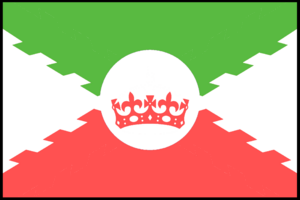Flag of Nasphilitae (Pacifica)
| Use | National flag, civil and state ensign |
|---|---|
| Proportion | 2:1 |
| Adopted | December 25, 1952 |
| Design | White, modified Cross of Saint Andrew with thorns, covering Nasphiliti Red background, with the Green Rose in the middle. |
Variant flag of Nasphilitae | |
| Use | Naval ensign |
| Proportion | 1:1 |
| Adopted | January 30, 1953 |
Variant flag of Nasphilitae | |
| Use | |
| Proportion | 1:1 |
| Adopted | January 30, 1953 |
The flag of Nasphilitae pictures a diagonal, white Cross of Saint Andrew, modified to resemble thorns, across a background of "Nasphiliti red", and a Green rose symbol in the middle. The flag was adopted in December 25th 1952. after independence, replacing the previous flag of the Crownlanded Grand Duchy of Nasphilitae. Saint Andrew is considered the patron Saint of Nasphilitae. Nasphiliti red is a traditional Nasphiliti colour contrasting "Austran red". The Green Rose is a traditional symbol of Nasphilitae, which serves as the country's National Flower. This flag is the national, state and civil flag. Previously used flag of the Dominion of Nasphilitae (1662—1851) (pictured third) serves as the war flag, while the preceding-state flag of the Crownlanded Grand Duchy of Nasphilitae (1851—1952) serves as the ensign flag. The relevant legislation regulating the use of flags is the Instrumental Rule on National Symbols of Nasphilitae, enforced as of January 30th, 1953.
Description
The flag of Nasphilitae and the war flag can be flown in whichever direction. The ensign flag must be flown vertically. Proportions of the national, state and civil flag are 2:1, proportions of the war and ensigns are 1:1 . The shade of red which is exclusively used in the national, state and civil flag are "Nasphiliti red", while the additional shade of red observable in the war and ensign flags is commonly referred to domestically as "Austran red".
| Scheme | Nasphiliti red | Green Rose | Austran red | White |
|---|---|---|---|---|
| CMYK | 0.84.84.0 | 100.0.67.40 | 0.100.100.17 | 0.0.0.0 |
| RGB | (255,42,42) | (0,153,51) | (212,0,0) | (255,255,255) |
| Hexadecimal | #ff2a2a | #009933 | #d40000 | #ffffff |
| HSL | (0,100%,58.2%) | (140,100%,30%) | (0,100%,41.6%) | (0,0,0,0) |
History
First showcase of a symbol related to Nasphilitae. Commonly used when referring to The Colonies of Nasphilitae (1589—1661) before Ordinance on Nasphilitae Establishing and unification of the colonies. However, this flag has never been made official during the Colonies existence. The flag of Dominion of Nasphilitae was adopted on December 15, 1661 in Agorport during Earl John Greenhills presentation of "THE Imperial Ordinance of Nasphilitae Establishment" (later shortened to "Ordinance on Unifying Colonies"). It's commonly mistaken that the flag was adopted as a result of The Home Rule Act a year later. The Ordinance was a result of negotiations held in Fort Masontown between Greenhill and an Imperial Delegation from Ausral Empire from September 15, 1661 ― December 15, 1661. The flag would be used for some 200 years, after which Nasphilitae would be elevated to the status of a Grand Duchy, during the reign of Queen Dorothy Atkinsons. Alike Greenhills efforts, Atkinsons managed to convince the Austral Empire of elevating Nasphilitaes status by negotiations. Unlike Greenhill, Queen Dorothy held negotiations by visiting the Imperial Core herself. This occurred intermittently, from August 27, 1851 — May 12, 1852, with the flag of The Crownlanded Grand Duchy (current ensign flag) being officially adopted on May 20, 1852. The current flag was adopted upon Imperial Grant of Independence on December 25, 1952. It is speculated that the independence was granted due to escalations in Great War occurring in Hai'Men during the summer of 1951., domestically dubbed "The HaiMen Overture". Interestingly, all three years of the three flags revolve around the same last two digits: (1661 and 1662; 1851 and 1852; 1951 and 1952).
Display and use of flags
The Instrument mandates that the national, state and civil flag be flown on flag poles of government and state facilities. Military vessels of the Royal Navy are mandated to use the flag of the Crownlanded Grand Duchy of Nasphilitae. The flag of the Dominion of Nasphilitae is permitted to be used only after and during a State of Collective Emergency; which is a specific situation, mobilizing all citizens and automatically enacting continuation of government.
Green rose symbolism
Coat of Arms and Emblem
The relevant legislation for the use of flags, Instrumental Rule on National Symbols of Nasphilitae (January 30th, 1953), also covers the uses and meanings of "Emblems" and "Coat of Arms". Namely, the national, state and civil emblem of Nasphilitae is to be used as an official marquise in all matters not related to the Nobility. Likewise, it is only the Nobility which may the Coat of Arms, and it is to be the only official marquise in all matters which do relate to the Nobility OR the country in bilateral and multilateral relations.
City banners and flags
Each of the four settlements which possess the status of "City" have their own banner with different symbolic meaning. Additionally, each City has their own associated colour:
- New Sorthane — "Green Rose" Green.
- Suhavenster — Pale orange (colloquially), "Austran Red" (formally).
- Agorport — Gold (formerly), Brown (colloquially), White (formally).
- Fort Masontown — Indigo purple and "Nasphiliti Red".




